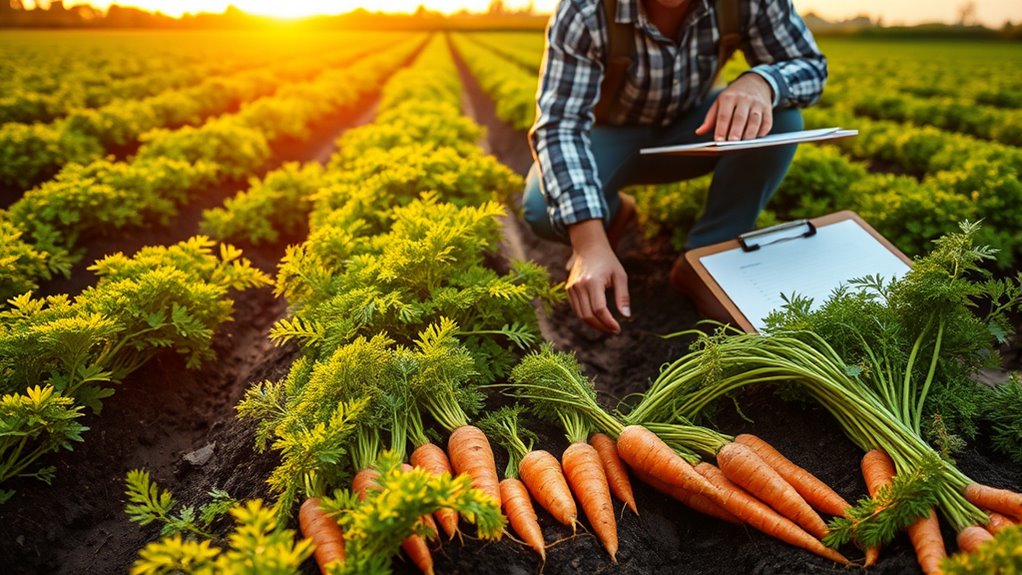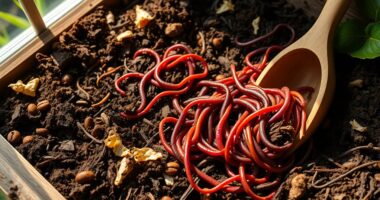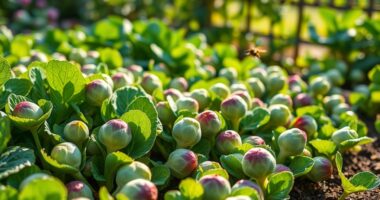To guarantee successful carrot production, I recommend starting with high-quality organic seeds, like Scarlet Nantes or Rainbow Blend. Preparing loose, sandy soil with the right pH and amending it with organic matter is vital. I always plant seeds 1/2 inch deep and space them properly. Consistent moisture and regular monitoring for pests are key. Finally, harvest when they’re the right size and store them in cool, dark places. Trust me, there’s even more expertise to uncover!
Key Takeaways
- Select high-quality, USDA certified organic, non-GMO seeds suitable for your growing conditions to ensure better germination and crop yield.
- Prepare loose, sandy soil with proper pH and organic amendments to enhance nutrient content and moisture retention for optimal carrot growth.
- Plant seeds at the right depth and spacing, and time your planting 3-5 weeks before the last frost for early harvests.
- Maintain consistent moisture levels and monitor for pests and diseases, implementing organic pest control methods to protect your crop.
- Harvest carrots at the desired size in dry conditions, and store them in a cool, dark place to prolong freshness and flavor.
Organic Carrot Seeds (Scarlet Nantes) – Approx 1500 Seeds

If you’re looking to cultivate delicious carrots in your garden, the Organic Carrot Seeds (Scarlet Nantes) are an excellent choice. These seeds produce sweet, coreless carrots with a vibrant red-orange hue, perfect for juicing or snacking. Certified organic by a USDA agency, I love knowing they’re non-GMO and heirloom. When planting, I sow them about 1/2 inch deep in loose, sandy soil, spaced 2 inches apart. With proper care and moisture, I see them mature in about 70 days. Plus, they even taste better after a light frost, making them a rewarding addition to my garden!
Best For: Home gardeners looking for organic, heirloom carrot seeds that yield sweet and nutritious carrots.
Pros:
- USDA certified organic and non-GMO, ensuring high-quality seeds.
- Produces sweet, coreless carrots ideal for various culinary uses.
- High germination rates reported by many customers, leading to successful growth.
Cons:
- Some customers have experienced issues with seed growth and germination.
- Requires specific soil conditions (loose, sandy soil) for optimal growth.
- May take up to 70 days to mature, which may not suit those looking for quicker harvests.
Organic Carrot Seeds (Rainbow Blend) – Approx 500 Seeds
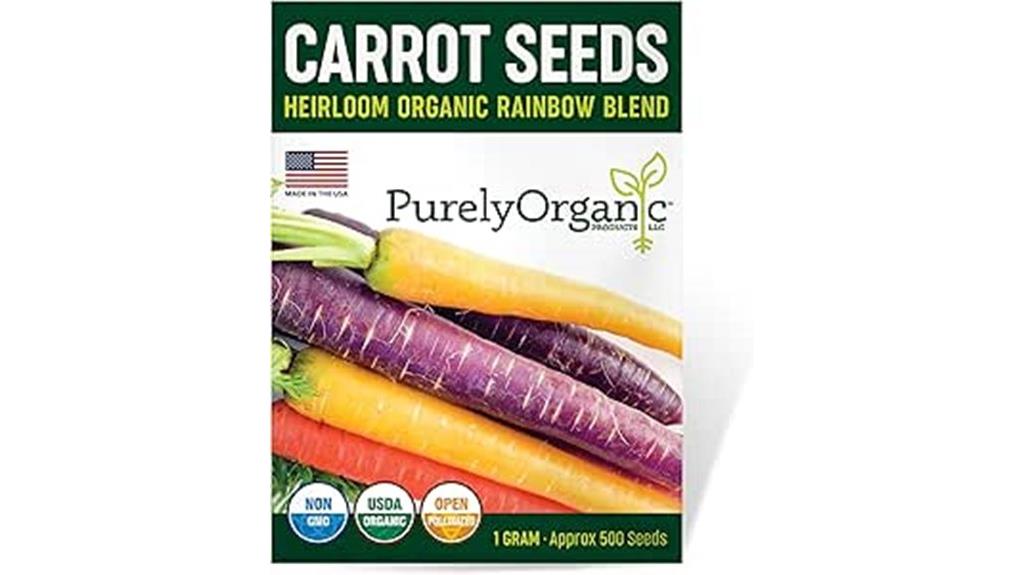
For gardeners seeking vibrant and flavorful carrots, the Organic Carrot Seeds (Rainbow Blend) offer an exciting variety that stands out in any vegetable patch. With about 500 seeds, these USDA Organic, non-GMO, heirloom seeds are perfect for growing sweet, juicy carrots right in your own backyard. I love planting them 3-5 weeks before the last spring frost for a fantastic harvest. The colors and flavors are incredible, especially after a light frost! Just keep the soil moist and watch them thrive. With great germination rates, this blend truly enhances my garden’s beauty and taste.
Best For: Home gardeners looking to grow a variety of colorful and flavorful carrots in their own vegetable patches.
Pros:
- USDA Organic and Non-GMO: Ensures high-quality, safe seeds for healthy gardening.
- Variety of Colors and Flavors: The rainbow blend adds visual appeal and diverse tastes to dishes.
- Good Germination Rates: Many users report successful sprouting, leading to a fruitful harvest.
Cons:
- Seed Quality Concerns: Some customers have noted issues with seed quality in certain batches.
- Requires Specific Soil Conditions: Needs loose, sandy soil with a specific pH for optimal growth.
- Longer Time to Maturity: Takes about 70 days to fully mature, which may require patience for some gardeners.
365 by Whole Foods Market Organic Carrot Bag, 16 oz
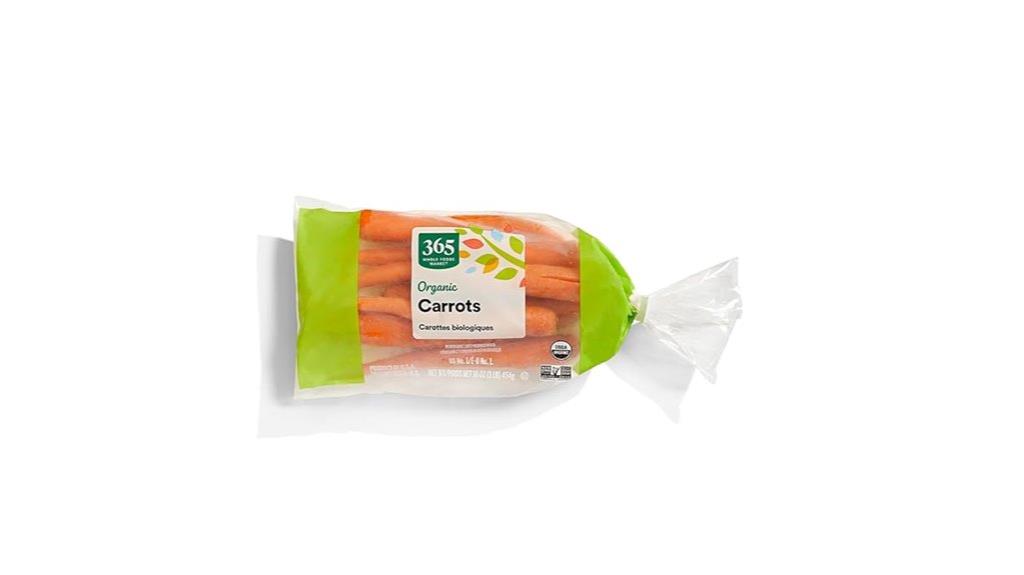
The 365 by Whole Foods Market Organic Carrot Bag, 16 oz, is perfect for health-conscious individuals looking for high-quality, fresh carrots. I love how they’re carefully sourced and stored to maintain their freshness. Before enjoying, I always wash them thoroughly. These carrots are fantastic for juicing, cooking, or even as a healthy snack. When I juice, I use a slow masticating juicer to keep all the vitamins intact. I usually add a splash of lemon juice for extra zing. Plus, they’re versatile enough for soups or roasted dishes, making them a staple in my kitchen. Give them a try!
Best For: Health-conscious individuals seeking high-quality, fresh carrots for juicing, cooking, or snacking.
Pros:
- Fresh and high-quality carrots sourced with care.
- Ideal for juicing, with techniques to maximize yield and nutrient retention.
- Versatile ingredient suitable for a variety of recipes, including soups and roasted dishes.
Cons:
- Size variation may be a concern for some customers.
- Requires washing before consumption, which may be inconvenient for some.
- Fresh carrot juice has a limited shelf life of about 48 hours.
Seed Packet – Carrot Rainbow Blend
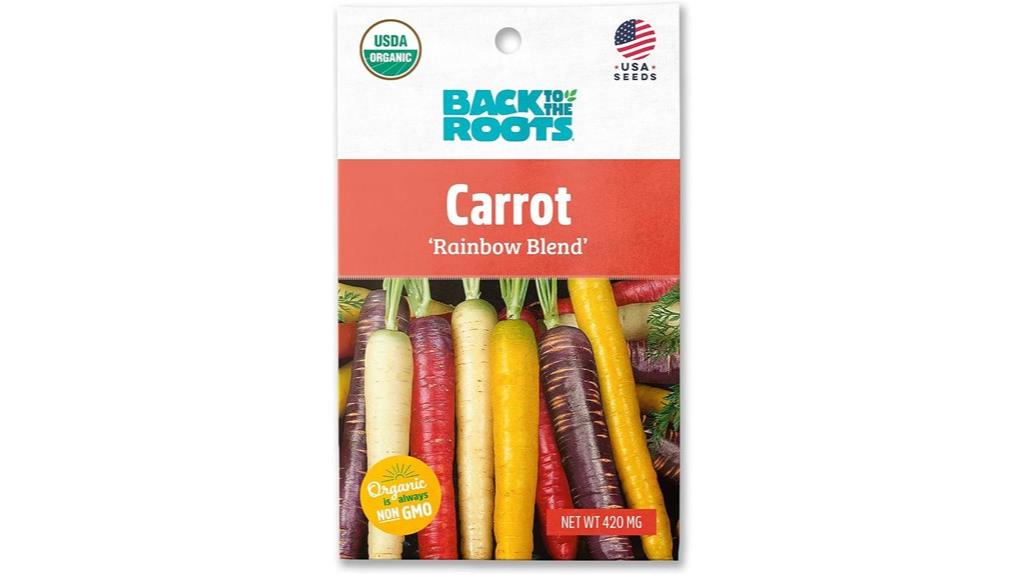
Looking to add a burst of color to your garden? I highly recommend the Carrot Rainbow Blend seed packet. These 100% organic, non-GMO seeds are perfect for both indoor and outdoor planting. I’ve found them easy to grow, even for beginners. They germinate quickly, and the variety offers stunning hues that brighten up any garden. Plus, they come with a zero-risk guarantee, so if they don’t grow, you can request more. It’s also a great gift for garden-loving friends, with a unique “Grow One Give One” campaign supporting classrooms. Just remember, proper planting conditions are key to success!
Best For: Garden enthusiasts and beginners looking to add vibrant colors to their garden with easy-to-grow, organic seeds.
Pros:
- 100% Organic and Non-GMO: Ensures no harmful substances are present that could hinder plant growth.
- Zero-Risk Guarantee: Customers can request more seeds if the initial ones do not grow, providing peace of mind.
- Ideal Gift Option: Beautifully packaged and supports educational initiatives through the “Grow One Give One” campaign.
Cons:
- Variable Germination Rates: Some customers have reported issues with germination and growth for certain seeds.
- Mixed Customer Support Experiences: Some users felt that customer service was lacking when they faced issues.
- Learning Curve for Beginners: New gardeners may encounter challenges and need time to improve their skills.
365 by Whole Foods Market, Carrot Petite Peeled Organic, 12 Ounce
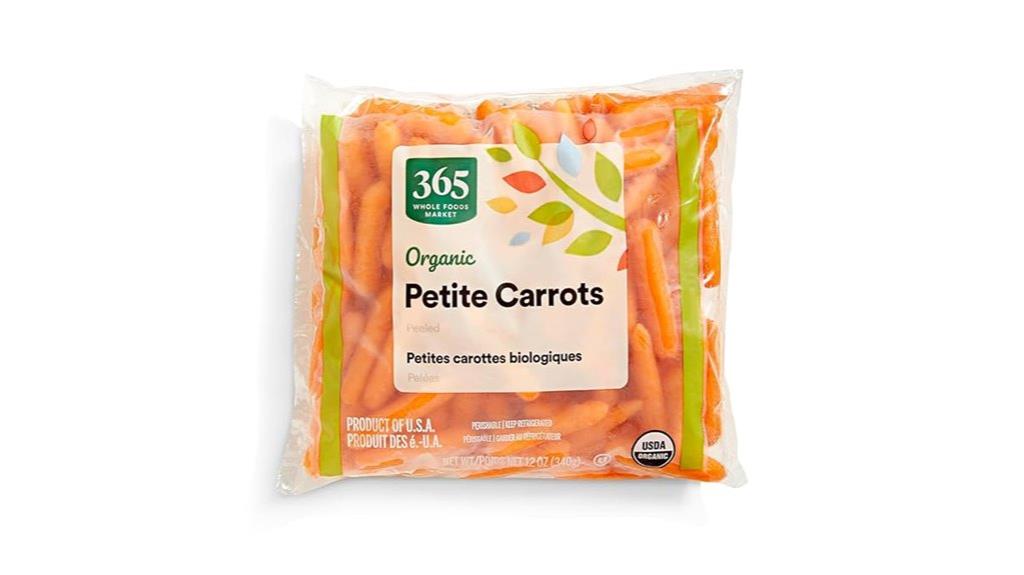
Convenience takes center stage with 365 by Whole Foods Market’s Carrot Petite Peeled Organic, 12 Ounce. These ready-to-use, pre-peeled, and pre-cut carrots save me so much time in the kitchen. They’re perfect for snacking, tossing into salads, or whipping up quick meals without any peeling hassle. Plus, their sweet, crisp texture makes them a hit with both kids and adults. I love that they’re certified organic and packed with vitamins, offering a healthier option for my family. Just toss them in lunchboxes or serve with dips, and you’ve got an appealing snack that everyone enjoys!
Best For: Busy families and individuals looking for convenient, healthy snack options without the hassle of preparation.
Pros:
- Convenient, ready-to-use carrots save time in meal preparation.
- Certified organic, free from synthetic pesticides and additives, promoting healthier eating.
- Sweet and crisp texture makes them appealing for both kids and adults.
Cons:
- 12-ounce packaging may not be sufficient for larger cooking needs, requiring multiple purchases.
- Peeled and pre-cut carrots may have a shorter shelf life compared to whole carrots.
- Limited versatility in recipes that require whole carrots for specific dishes.
Z Natural Foods Organic Carrot Powder (1 lb)
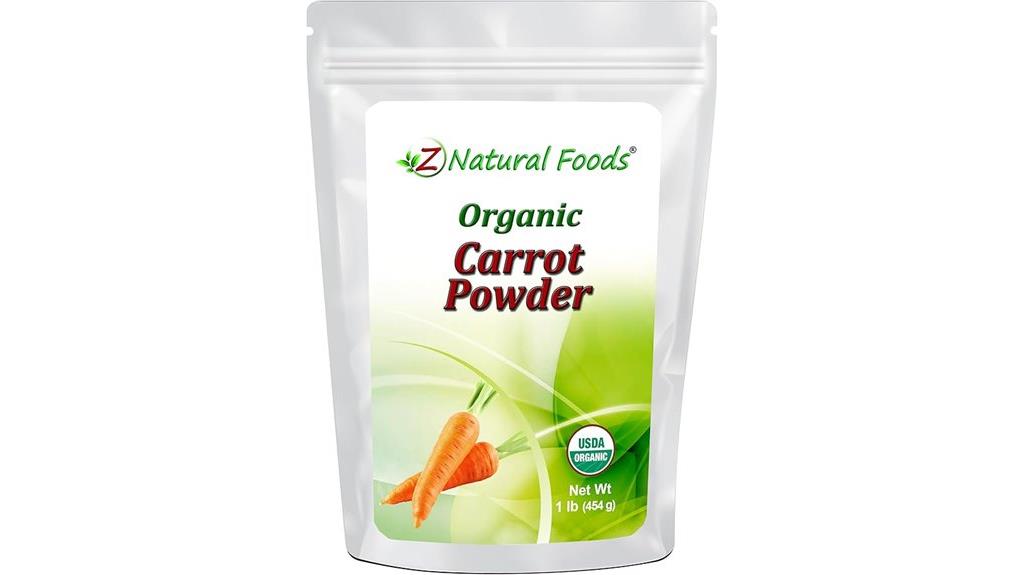
For health-conscious individuals seeking to boost their nutrition effortlessly, Z Natural Foods Organic Carrot Powder (1 lb) is a fantastic option. This certified organic superfood is packed with nutrients like carotenes, calcium pectate, and vitamins B and C, supporting vision and heart health. I love how versatile it is; it enhances juices, smoothies, and even savory dishes like soups and stews. Plus, it’s gluten-free, vegan, and non-GMO, making it perfect for various dietary preferences. Just a spoonful adds a vibrant flavor without waste, and its fine texture blends seamlessly into recipes, making healthy eating enjoyable and easy.
Best For: Health-conscious individuals looking to enhance their nutrition with a versatile and nutrient-rich superfood powder.
Pros:
- Gluten-free, vegan, and non-GMO, catering to various dietary preferences.
- Easily mixes into a variety of recipes, enhancing flavor and nutritional value.
- Positive user feedback highlights taste, ease of use, and minimal waste.
Cons:
- Some concerns about packaging and potential clumping issues.
- California warning regarding potential cancer risks associated with the product.
- Fine powder texture may require careful handling to avoid mess.
365 by Whole Foods Market, Carrot Baby Peeled Bag, 32 Ounce
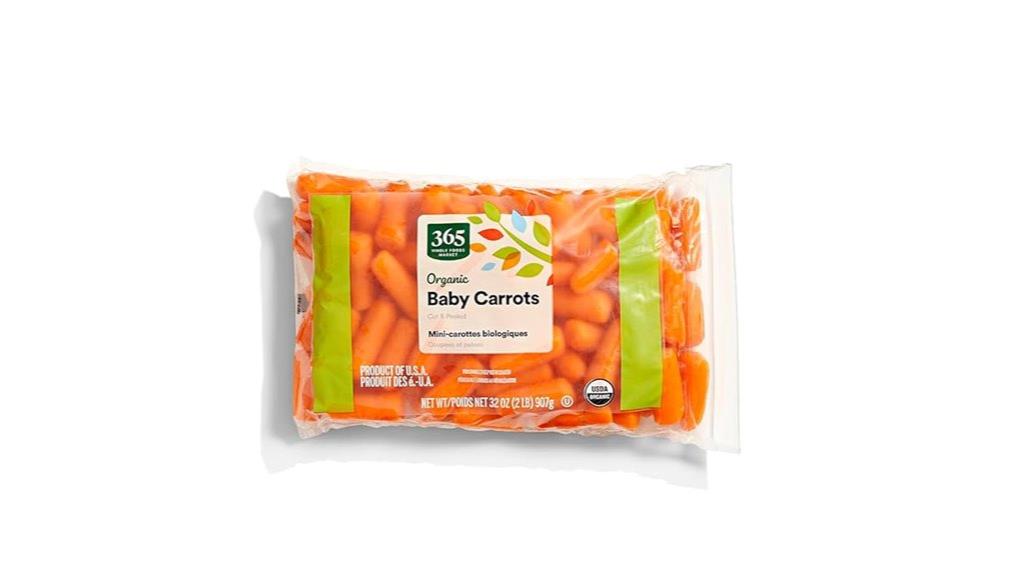
If you’re someone who values both convenience and quality in your snacking choices, the 365 by Whole Foods Market Carrot Baby Peeled Bag is a game changer. I love how these fresh, crisp carrots are ready to eat right out of the bag—no peeling or chopping required! The resealable packaging keeps them fresh, making it easy to grab a handful for a quick snack or toss them into salads. With their sweet flavor and crunchy texture, they’re a versatile addition to any meal. Plus, they’re packed with vitamins and fiber, making healthy snacking a breeze for my busy lifestyle.
Best For: Busy individuals and families looking for a convenient, healthy snack option that requires no preparation.
Pros:
- Convenience: Ready to eat right out of the bag, saving time on meal prep.
- Freshness: Resealable packaging helps maintain freshness for longer.
- Nutritional Value: Rich in vitamins, fiber, and antioxidants, promoting healthy snacking.
Cons:
- Price Variability: May be more expensive compared to other carrot options at different retailers.
- Washing Required: Recommended to wash before consuming, which adds a small step to convenience.
- Limited Shelf Life: Fresh produce may have a shorter shelf life compared to processed snacks.
Honbay 24PCS Simulation Carrots Mini Artificial Carrot Decorations
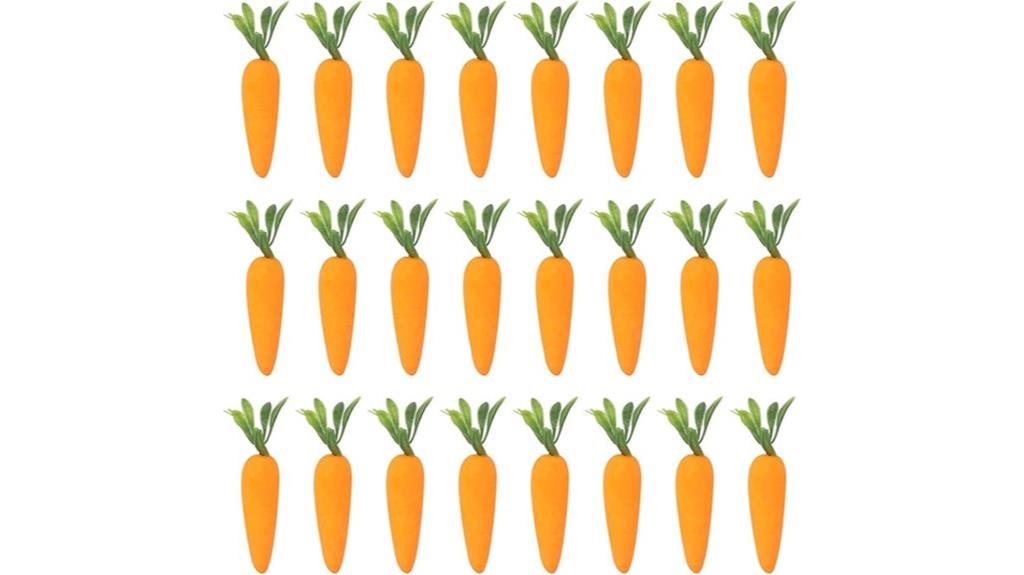
The Honbay 24PCS Simulation Carrots Mini Artificial Carrot Decorations are perfect for anyone looking to elevate their decor without the hassle of real produce. These charming little carrots, made from foam and plastic, are so realistic that it’s hard to tell them apart from the real deal. Measuring just under three inches in total length, they’re lightweight and durable, making them easy to clean and reuse. I love using them in my kitchen, at parties, or even as photography props. Plus, they’re a great way to avoid food waste while adding a pop of color to any setting!
Best For: Anyone looking to enhance their decorative space with realistic and hassle-free artificial carrots.
Pros:
- Realistic appearance that closely resembles genuine carrots, making them ideal for decoration.
- Lightweight and durable, allowing for easy handling and long-term reuse without maintenance.
- Versatile use for various settings including homes, restaurants, and photography, adding a vibrant touch.
Cons:
- Some customers have noted that the paint can scratch easily, affecting the product’s longevity.
- May not be suitable for those seeking highly detailed or premium quality decorations.
- Limited to a single color (orange), which may not fit all decor themes.
365 by Whole Foods Market, Organic Shredded Carrots, 10 Ounce
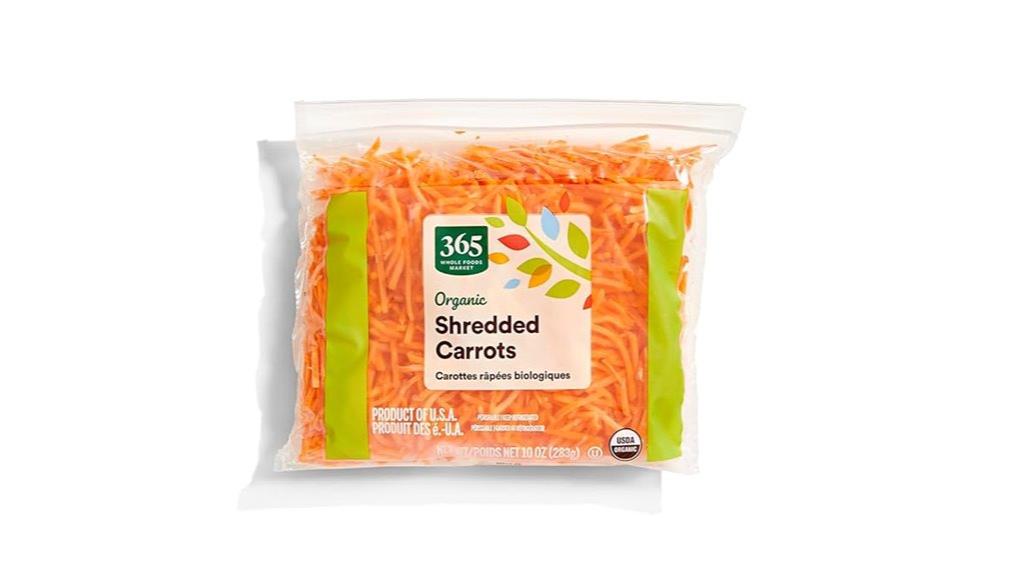
Organic Shredded Carrots from 365 by Whole Foods Market stand out as a fantastic choice for busy home cooks who value convenience without sacrificing quality. These 10-ounce packages are filled with vibrant, fresh carrots, ready to enhance any dish. I love how versatile they are—perfect for salads, soups, or even carrot cake! Plus, they help boost my veggie intake effortlessly. For ideal freshness, I recommend transferring them to a glass jar, as the original packaging can trap moisture. Overall, these shredded carrots make cooking simpler and healthier, allowing me to enjoy delicious meals in no time.
Best For: Busy home cooks looking for a convenient and healthy way to incorporate vegetables into their meals.
Pros:
- Versatile ingredient suitable for a variety of dishes, including salads, soups, and baked goods.
- Fresh and vibrant color, providing a visually appealing addition to meals.
- Easy storage in a glass jar helps maintain freshness and crisp texture.
Cons:
- Original packaging may trap moisture, potentially affecting freshness.
- Limited shelf life compared to whole carrots, requiring quicker consumption.
- May not be available in all grocery stores, limiting accessibility for some customers.
Hallelujah Diet CarrotJuiceMax Vegetable Capsules (240 Vegan Capsules)
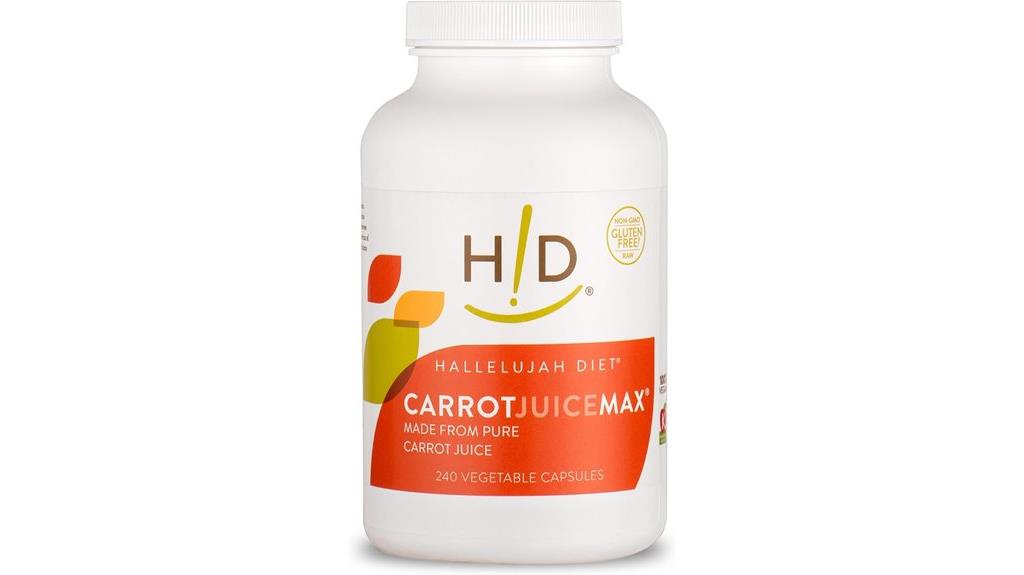
Looking for a convenient way to incorporate the health benefits of carrots into your daily routine? I highly recommend Hallelujah Diet CarrotJuiceMax Vegetable Capsules. Each bottle contains 240 vegan capsules packed with organic carrot juice, providing essential vitamins and minerals without any artificial ingredients. The low-temperature extraction process preserves crucial nutrients, especially beta-carotene, which supports overall health. Plus, the high fiber content can enhance digestion. You can easily take these capsules dry or mix them with water, making it a hassle-free alternative to traditional juicing. Just keep in mind some users report clumping, but the health benefits are worth it!
Best For: Individuals seeking a convenient and nutritious way to incorporate the health benefits of carrots into their daily diet.
Pros:
- High in nutrients: Contains organic carrot juice rich in beta-carotene and essential vitamins.
- Convenient: Easy to consume dry or mixed with water, making it a practical alternative to juicing.
- Supports digestion: The high fiber content can enhance gut health and overall digestion.
Cons:
- Clumping issues: Some users report that the capsules can clump together, making them difficult to use.
- Moisture sensitivity: Packaging may be affected by moisture during shipping, leading to quality concerns.
- Mixed reviews: Customer feedback varies, with some highlighting issues that could affect user experience.
365 by Whole Foods Market, Organic Carrots Bag, 80 Ounce
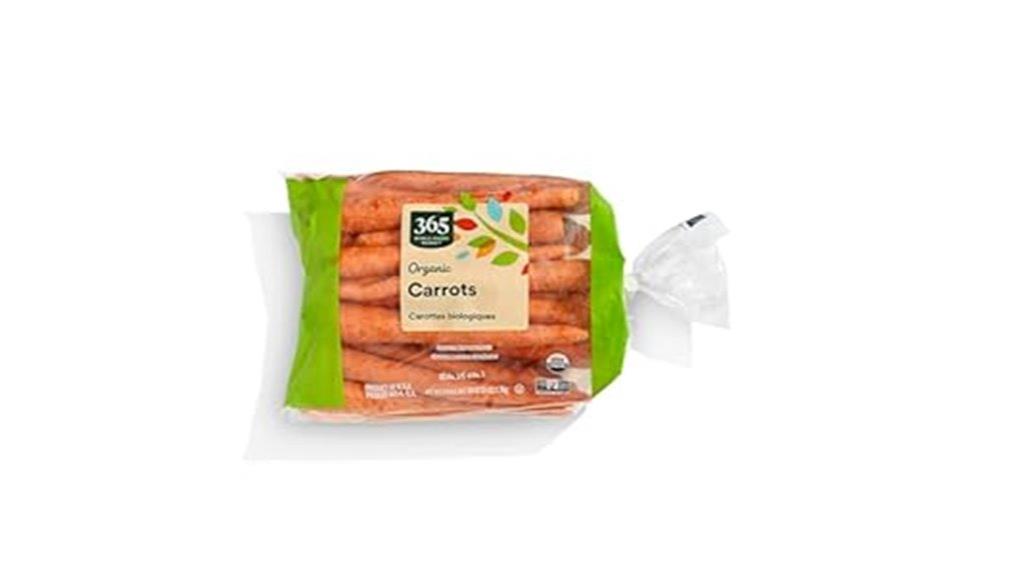
For anyone committed to clean eating and valuing high-quality produce, the 365 by Whole Foods Market Organic Carrots Bag, 80 Ounce, stands out as an excellent choice. These organic carrots are grown without synthetic pesticides, ensuring you’re getting pure, flavorful produce. I love their naturally sweet taste and satisfying crunch, making them perfect for snacking or cooking. With 80 ounces at your disposal, you can roast them with olive oil and herbs or toss them into salads. Plus, they stay fresh in the fridge, making it easy to incorporate them into various meals throughout the week.
Best For: Health-conscious individuals looking for high-quality, organic produce free from synthetic pesticides.
Pros:
- Naturally sweet flavor and satisfying crunch, ideal for snacking and cooking.
- Versatile usage for various dishes, from salads to roasted sides.
- Remains fresh in the refrigerator, making meal planning convenient.
Cons:
- The 80-ounce bag size may be too large for individual consumers or small households.
- Some users may find it challenging to use the entire quantity before spoilage.
- Limited availability may vary by location, potentially restricting access for some customers.
Amazon Fresh, Canned Sliced Carrots, 14.5 Oz
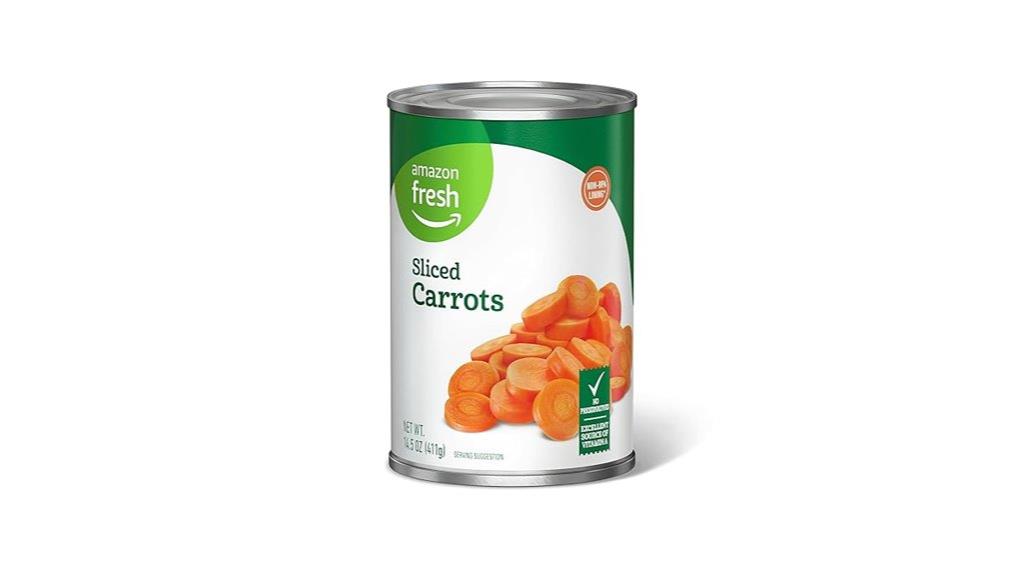
Amazon Fresh’s Canned Sliced Carrots, 14.5 oz, stands out as an excellent choice for anyone seeking convenience without sacrificing quality. With no preservatives and a non-BPA lining, I appreciate that I’m getting a product that’s an excellent source of Vitamin A. The taste is surprisingly good, free from that metallic flavor often found in canned goods. They’re not mushy, making them perfect for soups or as a side dish. Plus, the affordability compared to name brands makes it a go-to for quick meals or emergency supplies. I’ve found this product to be reliable and versatile, and I highly recommend it!
Best For: Those seeking a convenient, nutritious, and affordable canned vegetable option for quick meals or emergency supplies.
Pros:
- No preservatives and non-BPA lining, ensuring a healthier choice.
- Good taste and texture, free from metallic flavor and not overly mushy.
- Affordable compared to name brands, making it ideal for budget-conscious shoppers.
Cons:
- Some cans may arrive dented, which could be visually unappealing.
- Limited flavor variety as they are only sliced carrots.
- May not satisfy those looking for fresh produce alternatives.
La Costeña Sliced Pickled Carrots 14.1 oz (6-Pack)
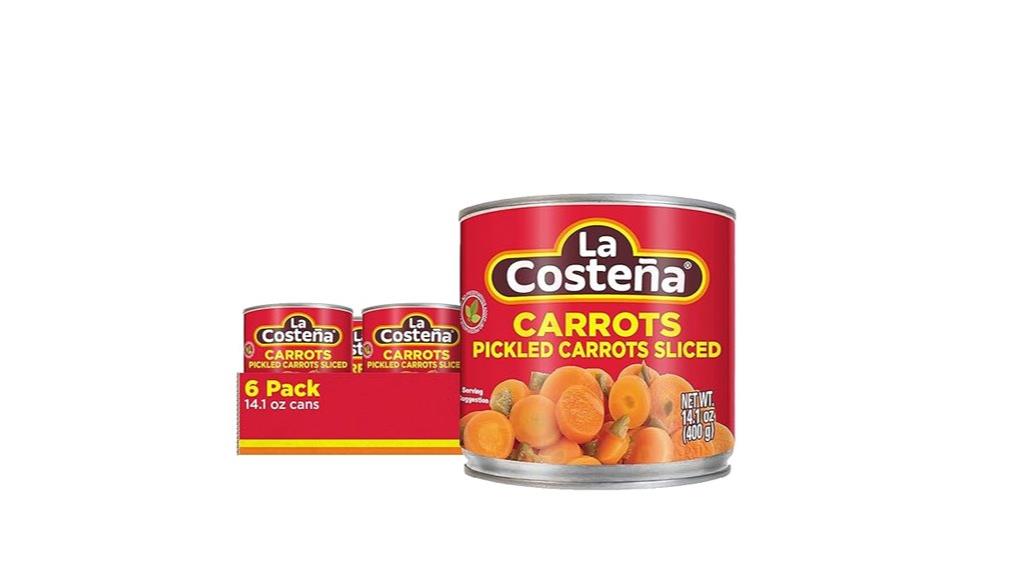
If you appreciate the vibrant taste of pickled carrots, La Costeña Sliced Pickled Carrots 14.1 oz (6-Pack) is a fantastic choice for enhancing your culinary creations. These sliced carrots, combined with jalapeño peppers and spices, bring a delightful crunch and flavor to any dish. They’re perfect for street tacos or as a quick snack. I love the convenience of the pull-top lid, making preparation a breeze. Plus, with zero cholesterol and low carbs, they fit into various diets. Just be mindful of potential denting during delivery; otherwise, I’ve had a great experience with taste and quality.
Best For: Those who enjoy flavorful, low-carb snacks and want to enhance their meals with a zesty kick.
Pros:
- Convenient pull-top lid for easy access and preparation.
- Versatile ingredient that complements a variety of dishes, especially street tacos.
- Zero cholesterol and low in carbs, making it suitable for various dietary needs.
Cons:
- Some customers report dented cans upon delivery.
- Mixed reviews regarding chewiness; may require microwaving for easier consumption.
- Occasional issues with incorrect orders or damaged products.
365 by Whole Foods Market, Carrot Sticks Organic, 12 Ounce
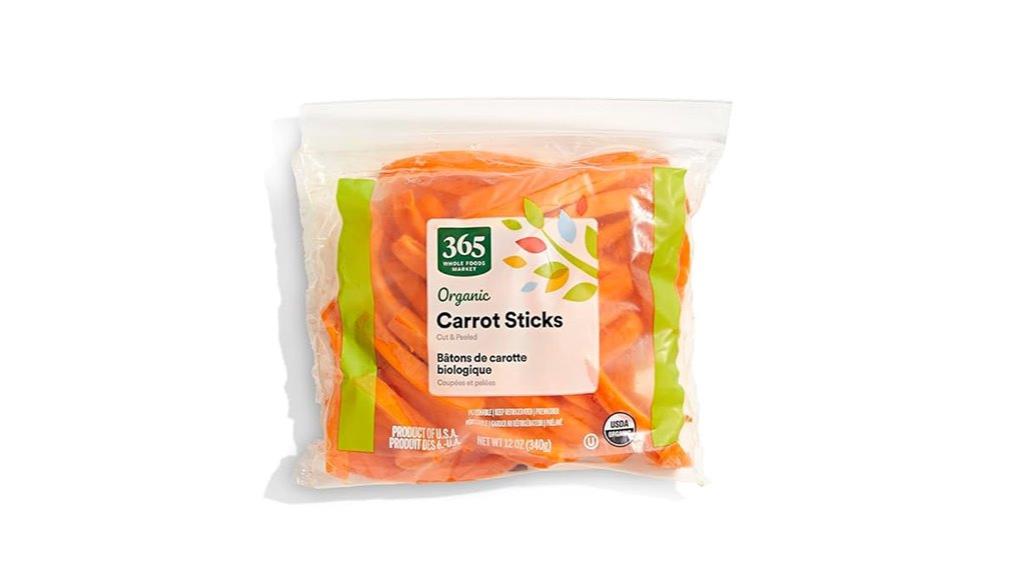
Looking for a convenient and healthy snacking option? 365 by Whole Foods Market’s Organic Carrot Sticks, packaged in a 12-ounce bag, are an excellent choice for anyone seeking fresh, high-quality vegetables. I love how these carrot sticks offer a crunchier texture and longer shelf life compared to baby carrots. They’re perfect for dipping or adding to veggie trays. I recommend washing them before enjoying, and while they’re versatile for cooking, my favorite way is roasting them with olive oil, honey, and spices. Packed with nutrients, they support vision and heart health, making them a guilt-free treat!
Best For: Health-conscious individuals looking for a convenient snack option that provides nutritional benefits and versatility in cooking.
Pros:
- Fresh and crunchy texture with a longer shelf life than baby carrots.
- Convenient for snacking, dipping, or adding to recipes.
- Rich in nutrients that support vision, heart health, and immunity.
Cons:
- Some users have reported freshness issues after a few days.
- Requires washing before consumption, which may be inconvenient for some.
- Limited availability in certain locations compared to other snack options.
Factors to Consider When Choosing Carrot Production

When I choose to grow carrots, I focus on several key factors that can make or break my crop. Seed quality, soil conditions, and proper planting timing are just a few elements that I consider essential for success. I also pay close attention to watering needs and sunlight exposure to guarantee my carrots thrive.
Seed Quality and Certification
Choosing the right seeds is essential for successful carrot production, as high-quality seeds directly influence germination rates and crop yield. I’ve learned that certified organic seeds not only meet strict agricultural standards but also enhance soil health and biodiversity. If you want to promote genetic diversity, consider using open-pollinated seeds; they allow for natural crossbreeding, which can lead to better adaptability in your local growing conditions. Don’t overlook the importance of non-GMO seeds, as they support traditional farming practices and meet consumer demand for natural products. Finally, heirloom varieties can offer unique flavors and characteristics, making them a great choice for niche markets or home gardeners seeking diverse produce. Your seed selection can truly make a difference.
Soil Preparation and Conditions
After ensuring you have high-quality seeds, the next step is preparing the soil, which plays an essential role in carrot production. Carrots thrive in loose, sandy soil with a pH between 5.5 and 6.8, allowing for proper root development. I recommend tilling the soil to a depth of at least 12 inches to create a fine seedbed that promotes even growth. Amending the soil with organic matter, like compost, boosts nutrient content and helps with moisture retention while ensuring good drainage. Carrots love full sun, so make sure they get at least 6 to 8 hours of sunlight daily. Finally, maintain consistent moisture through shallow waterings to prevent stress and encourage healthy carrot development.
Planting Timing and Depth
To achieve a successful carrot harvest, timing and planting depth are vital factors to take into account. I usually sow carrot seeds outdoors 3-5 weeks before the last spring frost or in mid to late summer for a reliable fall harvest. Planting them at a depth of 1/2 inch in loose, sandy soil with a pH between 5.5 and 6.8 guarantees peak growth. I space the seeds about 2 inches apart in rows that are 12-14 inches apart, giving them enough room to develop properly. Remember, carrots can handle light frost, and their flavor actually improves after frost exposure as they store sugars. With an expected maturity of around 70 days, timing is critical for a bountiful harvest.
Watering and Moisture Needs
Once your carrots are planted, maintaining proper watering and moisture levels becomes key to their growth. I’ve found that keeping the soil consistently moist, but not waterlogged, is important—especially during germination and early growth stages. Shallow watering encourages deep root growth, and about 1 inch of water per week works wonders for mature plants. It’s necessary to regularly check soil moisture, as both under-watering and over-watering can lead to problems like cracking or rot. Mulching around your carrots can help retain moisture, regulate temperature, and suppress weeds, creating a better environment for growth. Remember, light frost can enhance sweetness, but adequate moisture remains critical during this time for ideal carrot development.
Sunlight Exposure Requirements
While I understand that carrots can tolerate some shade during germination, it’s crucial to guarantee they receive full sun exposure as they grow. Ideally, they need at least 6 to 8 hours of direct sunlight each day for peak growth and sweetness. Insufficient sunlight can stunt their growth and lead to poor flavor since carrots develop sugars more effectively in bright conditions. Once established, they truly thrive in unobstructed light. Planting in sunny spots not only boosts their resilience, making them less prone to disease and pests, but also enhances the photosynthesis process important for energy production. So, when choosing a location for your carrots, prioritize those sunny areas for the best results.
Pest and Disease Management
Effective pest and disease management is essential for successful carrot production. I’ve found that implementing crop rotation and intercropping can greatly reduce pests and diseases by disrupting their life cycles. Regularly monitoring for common pests like aphids and root maggots allows for early detection and effective interventions, minimizing crop damage. I prefer using organic pest control methods, such as introducing beneficial insects like ladybugs or applying neem oil, to keep pest populations in check without harming the environment. Choosing disease-resistant carrot varieties boosts resilience against pathogens like Alternaria and Fusarium. Finally, maintaining ideal soil health through proper fertilization and irrigation strengthens plants’ immune systems, making them less susceptible to both pests and diseases.
Harvesting Techniques and Timing
Harvesting carrots at the right time is essential for achieving the best flavor and texture. Typically, I find that carrots reach maturity in about 70 days, so I plan my harvest accordingly. For “baby carrots,” I harvest them when they’re around 1 inch in diameter, while fully mature carrots offer that sweet, tender crunch we all love. I’ve noticed that a light frost can actually enhance their sweetness, as it allows sugars to concentrate. When it’s time to harvest, I prefer dry conditions to keep soil from clinging to the roots, which can cause damage. Early mornings or late afternoons are my go-to times, as they minimize stress on the plants and help maintain freshness.
Storage and Shelf Life
When I think about storing carrots, I know that proper conditions can greatly extend their shelf life and maintain their quality. Whole carrots, when unwashed, can last up to 3-4 weeks in the refrigerator, while pre-cut or peeled varieties don’t fare as well. For shredded or baby carrots, using airtight containers or resealable bags keeps them fresh for about a week. It’s essential to store carrots at around 32°F (0°C) with high humidity to prevent them from drying out. I also make sure to keep them away from ethylene-producing fruits like apples and bananas, which can speed up spoilage. If you choose canned carrots, remember they last years unopened, but only 3-4 days once opened.
Frequently Asked Questions
What Is the Best Soil Type for Growing Carrots?
When I think about the best soil type for growing carrots, I always prioritize sandy loam. It’s well-draining and loose, allowing those delicious roots to grow long and straight. I also make sure it’s rich in organic matter, which helps with nutrient retention. Avoiding heavy clay soils is key since they can cause deformities. So, if you’re planning to grow carrots, focus on that sandy loam for the best results!
How Often Should I Water My Carrot Crops?
I remember anxiously checking my carrot patch, wondering if I was giving them enough water. Carrots thrive with consistent moisture, so I water them about once a week, adjusting based on rainfall and soil type. When the top inch of soil feels dry, I know it’s time to water again. I’ve found that keeping a close eye on them helps guarantee those sweet, crunchy roots develop beautifully. It’s all about balance!
What Pests Commonly Affect Carrot Plants?
When it comes to pests that commonly affect carrot plants, I’ve encountered a few that you should watch out for. Aphids are pesky little critters that suck sap from the leaves, and I’ve seen them spread diseases too. Carrot rust flies can ruin your crop by laying eggs near the roots. I also pay attention to nematodes, which can damage the roots underground. Keeping an eye on these pests has really helped my carrot yields!
When Is the Ideal Time to Harvest Carrots?
I remember the first time I harvested my carrots; I couldn’t wait to see how they turned out. The ideal time to harvest carrots is typically 70 to 80 days after planting, depending on the variety. You’ll know they’re ready when the tops are about an inch in diameter. If you wait too long, the carrots can become woody. So, keep an eye on them, and enjoy the fruits of your labor!
How Can I Store Harvested Carrots for Freshness?
After I’ve harvested my carrots, I always make sure to store them properly for freshness. First, I gently brush off the soil without washing them, as moisture can lead to rot. Then, I place them in a breathable container, like a cardboard box, lined with damp newspaper or sand. I keep them in a cool, dark place, ideally around 32°F. This method really helps me enjoy my carrots for weeks!
Conclusion
In the vibrant tapestry of carrot production, each seed is like a promise waiting to bloom. By choosing the right seeds and nurturing them with care, you’re not just growing vegetables; you’re cultivating a connection to nature’s bounty. Remember, success in the garden mirrors life—it’s all about patience, attention, and love. So, roll up your sleeves, dig in, and watch as your efforts transform into a beautiful harvest that nourishes both body and soul.
